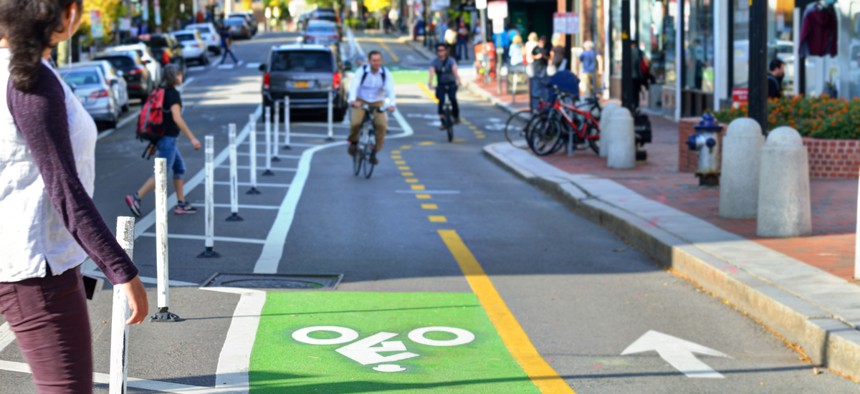Vast Majority of Mayors Believe Their Cities Are Too Car-Oriented, Survey Finds

Shutterstock

Connecting state and local government leaders
But the city leaders also voice skepticism of cutting back on public parking or lowering speed limits.
Mayors from around the U.S. in a new survey released on Tuesday raised concerns about pedestrian and cyclist safety and indicated that they believe their cities are too car centric.
The 2019 Menino Survey of Mayors was spearheaded by researchers at Boston University and is based on interviews with 119 mayors conducted last summer.
Seventy-six percent of the mayors said they either agreed or strongly agreed with the statement that their city is “too oriented towards cars.” Nearly 40% said they believe travel for pedestrians in their cities is unsafe and almost half expressed concerns about cyclists’ safety.
But the mayors also seemed skeptical that speed limits in their communities needed to be lowered, with 77% indicating that they believe local limits are generally set at the right level. Experts commonly cite higher vehicle speeds as a leading factor in crashes that result in pedestrians or cyclists getting seriously injured, or killed.
A majority of the mayors, 60%, also said that their city has the right amount of street parking and 27% said there is too little. Most also said street parking is priced at the right level.
Critics of inexpensive public parking often charge that it encourages people to drive and takes up valuable space that could be used for other types of street infrastructure—in other words, abundant street parking is viewed by some as contributing to overly car-centric cities.
The survey results also appeared to highlight a misconception among mayors when it comes to how effective certain bike lanes are in improving cyclist safety.
Just over 80% of mayors said they viewed painted bike lanes as a safe alternative when physically separated lanes are too costly. But a report on the survey findings flags recent research that has found that painted lanes may actually create dangers for cyclists.
Most mayors, 71%, did support the idea that roads should be made more accessible to cyclists, even if it means sacrificing parking spots or driving lanes.
The survey findings come at a time when road safety and cycling advocates have been highlighting a troubling rise in pedestrian and cyclist deaths in the U.S. in recent years.
In responding to the survey, the mayors weighed in on a wide variety of other topics.
“This Survey provides unrivaled insight into the priorities and thinking of America’s urban leaders—especially at a time when they have been given responsibility for an extraordinary range of pressing problems,” said Graham Wilson, director of BU’s Initiative on Cities.
When asked about what issue related to cities they hoped would get attention during the 2020 election cycle, 45% of the mayors said infrastructure. This was the most popular answer by a margin of 30 percentage points and mirrors the results from prior surveys.
Roads are a top infrastructure priority for mayors. But the report notes that a growing number of mayors appear also to be concerned about water, sewer and stormwater projects. Fifty-one percent of them ranked these types of projects among the top three areas where they’d devote significant new infrastructure dollars—that’s a 10 percentage point increase compared to 2015.
About 70% of mayors overall said that they either agree or strongly agree that cities should play a “strong role” in reducing the effects of climate change, even if it means giving up revenues, or spending public money. But there were sharp partisan divides on this topic.
Among Democrats, 92% of mayors agreed that cities should attempt to tackle climate change, even if there’s a financial toll. Only 25% of Republicans said the same.
The survey focuses on mayors in cities with 75,000 or more people. The average population size for cities represented this year was 228,000 residents. Sixty-three percent of the responding mayors were Democrats and 25% Republicans. About three-quarters were male and 81% were white.
The late Thomas Menino, who the survey is named for, served five terms as the mayor of Boston in the 1990s and 2000s. The survey is supported by Citi Community Development and The Rockefeller Foundation. More about it can be found here.
Bill Lucia is a Senior Reporter for Route Fifty and is based in Olympia, Washington.

NEXT STORY: Leveraging hybrid clouds for agency workloads





